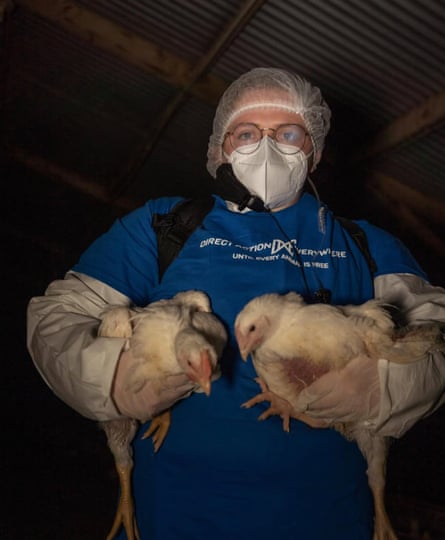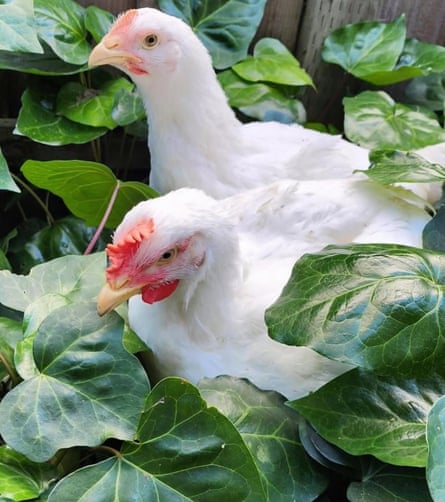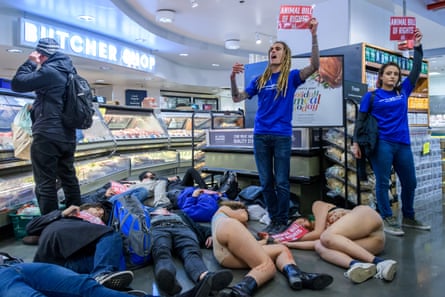On a Monday afternoon in late September, Zoe Rosenberg, a 23-year-old University of California, Berkeley, student, emerged from a courtroom in Santa Rosa, California. Flanked by her lawyers, she moved briskly through the courthouse corridors, past more than 100 prospective jurors.
Pinned to her black blazer was a tiny silver chicken, glinting on the lapel.
It was one of the last days of jury selection for Rosenberg’s trial. She was facing two misdemeanor charges for trespassing and one for tampering with a vehicle, as well as one count of felony conspiracy. If convicted on all charges, she could spend up to four and a half years in jail.
The facts at the center of the case were not in dispute. Just past midnight on 13 June 2023, Rosenberg and several other members of the group Direct Action Everywhere (DxE) drove to Petaluma Poultry, a slaughterhouse about 40 miles (64km) north of San Francisco. Disguised as workers, they encountered a truck filled with thousands of live chickens packed into crates. They removed four chickens, placed them in buckets and drove away.
These facts were not in dispute because Rosenberg and her fellow activists had subsequently released video footage of what they had done. “It’s not a whodunit,” Rosenberg’s lawyer, Chris Carraway, likes to say. “It’s a whydunit.”
After leaving the slaughterhouse, the activists examined the chickens – whom they named Poppy, Ivy, Aster, and Azalea - more thoroughly. Rosenberg says they were splattered with diarrhea and suffering from wounds and abrasions.
Carraway would explain in court that Rosenberg’s intent was not to steal the birds, but to aid them. The jurors would be asked to determine, in effect, how far compassion can go before it becomes a crime.
The daughter of a veterinarian, Rosenberg grew up on 40 acres (16 hectares) in San Luis Obispo county, California, surrounded by cats, dogs, goats, guinea pigs and rabbits.

When she was nine, the family got back-yard chickens. She can still rattle off their names without pausing: Eddie, Chirp, Olive, Herki, Red, Daisy and Popcorn. Until then, Rosenberg had shared the common assumption that chickens were not too bright, but getting to know them changed her views. “I realized they have unique personalities and that they’re so smart and curious, and that their lives are really, really valuable.”
Two years later, Rosenberg watched an online video of activists entering a big egg farm in Australia and removing chickens. It was the first time she had gotten a glimpse inside a factory farm, and she was shocked by the conditions: thousands upon thousands of hens packed tightly into cages. It was also her introduction to the concept of “open rescue”, the term activists use to describe operations in which they infiltrate factory farms or research facilities and remove animals they deem to be in distress. They make no secret of their work, often posting footage of their actions.
After watching the video, Rosenberg immediately knew that was something she wanted to do, and she emailed the director of the group behind it. (“She had no idea I was 11,” Rosenberg recalled.) The next year, in 2015, she founded the San Luis Obispo chapter of DxE, a then new animal rights organization.
Over the years, animal rights groups have gained a reputation for using confrontational tactics – such as Peta’s campaign comparing meat consumption to the Holocaust or stunts that involve splattering fur with fake blood. The logic is simple: it takes shock to jolt people out of complacency about animal suffering. But the result is often the opposite: turning people off. In a society where eating meat is the norm, many see such protests as a personal attack – and feel judged, not persuaded.
DxE follows in this tradition; they have held “die-ins” outside a butcher shop in Berkeley and disrupted a Friday dinner at the beloved restaurant Chez Panisse.
But the group’s signature move has been “open rescues”. From the activists’ perspective, one virtue of the tactic is that it does not just call attention to an injustice – it attempts, in a small way, to correct it. It also targets the industry rather than implicating individual consumers, and offers a glimpse into the hidden world of animal agriculture.
“The court cases that we have are kind of a vehicle to pose the question to a randomly selected jury of our peers, and to others through the media,” said Cassie King, DxE’s communications lead. “Is it a crime, or is it the right thing to do, to rescue an animal who’s dying in a factory farm?”

Already, DxE activists note, there are “right to rescue” laws in California and 13 other states granting people criminal and civil protection if they forcibly enter a motor vehicle to remove an endangered animal. Their argument is that the same principle should apply to all animals in distress.
Since 2014, according to King, members of the group have participated in about 60 such operations. In the past few years, activists have taken two piglets from a Utah factory farm; two chickens from a Foster Farms truck outside a slaughterhouse in Merced county, California; and three dogs from a breeding and research facility in Wisconsin. After removing the animals, the activists provide them with veterinary care and place them in new homes.
Mike Weber runs Weber Family Farms with his brother in Petaluma. The farm has been in his family for 113 years, he told me. It is an egg-laying operation with just under 1 million chickens, housed in about two dozen buildings. The business, which is powered by more than 2,500 solar panels, also turns the chickens’ manure into organic fertilizer.
In May 2018, DxE activists staged a large-scale operation on his farm. Several hundred activists showed up to protest. A fraction of these stormed on to the property and broke into a chicken house over the objections of Weber and his employees, as captured in a Vice documentary. They grabbed about six chickens.
To Weber, it’s simple: “You can’t trespass. You can’t break into locked buildings. You can’t go and steal things out of people’s cars or buildings or food processing plants.” He maintains that all of the chickens the activists took were healthy. “The only thing that was wrong was the way in which they were holding them – they were compressing the air sacs; they did not know how to hold a chicken.” (King, of DxE, disputed this.)
Another point of contention involves infectious diseases. Activists emphasize that the conditions of factory farms, with tens or hundreds of thousands of animals crammed together, pose the risk of disease outbreaks, which can threaten the animals’ as well as the public’s health. But critics allege that the activists themselves, by breaking into these facilities, can introduce pathogens, with serious consequences.
In November 2023, a severe avian flu outbreak swept through Sonoma county, affecting 10 sites. More than 1 million birds were killed to stop the spread. Weber lost every chicken. In the weeks leading up to the outbreak, Rosenberg and other activists had entered at least one of these facilities.
A 2024 report from the California department of food and agriculture concluded: “Given the high number of wild birds migrating through the area at that time shedding virus into the environment, as well as the egregious nature of these biosecurity breaches, it is plausible that virus was introduced into the index Sonoma premises during those incidents.”
Yet the report also noted concerns about the biosecurity practices of all the infected premises, which may have contributed to the outbreak. (DxE activists say they take biosecurity precautions that exceed industry standards.)

Wayne Hsiung, a DxE founder, was later convicted of trespassing and felony conspiracy for his role in the protests at Weber’s farm as well as a duck farm in Sonoma county. He was sentenced to 90 days in county jail and served about half that time.
Even so, Hsiung and other activists have won a series of unexpected victories: in two of the cases mentioned above, juries acquitted the defendants.
In October 2022, Hsiung and Paul Darwin Picklesimer were found not guilty of burglary and theft for removing the two piglets from the Utah farm. And in March 2023, two activists – one of whom was Baywatch actor Alexandra Paul – were acquitted of all charges after removing two chickens from the truck in Merced, California.
In both cases, the defense argued that the goal was not to steal property but to rescue animals that were sick and suffering. Veterinarians testified about the ill health of the animals. Another key point was that because of their condition, the animals had no monetary value to the companies – if anything, they were a financial liability.
The activists were defended by attorneys at the animal law program at the University of Denver, founded in 2021 by law professor Justin Marceau to bring legal savvy to the fight for animal rights. (Carraway, Rosenberg’s lawyer, is associated with this clinic.)
These acquittals were “pretty earth-shattering”, said Camille Labchuk, executive director of Animal Justice, a Canadian legal advocacy organization. “To me what it represented was the power of being able to tell people the stories of what animals endure, tell the personal stories of the rescuers.” She added that it reflected “a real triumph of the ability of people to put aside their preconceived beliefs” and “a real triumph of logic and reason”.
Back at the courthouse, the jurors at last were permitted to file into the courtroom. Rosenberg’s supporters – about a dozen fellow activists, who were younger than the median age, with more conspicuous tattoos – waited outside in the corridor. They all wore coral crepe-paper poppies, in honor of Poppy, one of the four chickens, pinned to their shirts.
Twenty of the prospective jurors were called up by their four-digit numbers to sit in the jury box and answer questions from the judge, Kenneth J Gnoss. There was a registered nurse, a grocery clerk, a mortgage loan officer. One prospective juror had grown up on a beef cattle ranch; one had a nephew who participated in the 4H club; another had 16 chickens and one rooster in his back yard. When the prosecutor questioned them, he asked if anyone was a vegan or vegetarian. No one raised a hand.
Sonoma county is known for its organic and regenerative farming practices. Petaluma Poultry – a subsidiary of Perdue – prides itself in being “a pioneer in free range and organic poultry”, according to its website. “We provide locally raised, fresh organic and free range chicken with ranches in and around Sonoma county.”
In a statement, Robert Muelrath, a spokesperson for Petaluma Poultry, wrote: “Animal care is at the heart of everything we do. Birds have room to roam, access to the outdoors and natural enrichments and are raised on a healthy, antibiotic-free diet. Independent audits from the USDA and Global Animal Partnership regularly verify our compliance with strict free range and organic standards, and USDA personnel are on-site at our harvesting facility daily to oversee operations.”
But DxE activists dismiss such claims as “humanewashing”. For several years leading up to the night in question, Rosenberg and her peers tried to get local officials to investigate Petaluma Poultry, to no avail. In a 2023 “investigatory report”, they allege that during clandestine visits to six northern California factory farms that supply chickens to the company, they found routine violations of state animal cruelty laws, including “birds collapsed on the floor or stuck on their backs and unable to walk to food or water, left to slowly starve to death”. They also reported wing and joint injuries, open sores, feather loss and “necrotic wounds so deep that muscle and bone were exposed”.
After court let out for the day, I joined Rosenberg, Carraway and two other activists at a nearby bar.
Rosenberg, quiet and unassuming, seemed an unlikely firebrand. I thought I might find her sanctimonious, but as hard as I tried, I couldn’t detect a hint of self-righteousness. She had a plastic tube taped across her face, from her nose across her right cheek – a feeding tube she needed due to complications from diabetes. She said that living with a disability for the past 15 years has made her empathize with sick and injured animals – it’s painful, she added, to think of them suffering without care.
“It feels good to finally have our day in court and, more importantly, what feels like these animals’ day in court,” she said. For almost two years leading up to the trial, Rosenberg’s travel was restricted, and she was prohibited from setting foot on any property where animals are raised for meat, dairy or eggs. She was also required to wear an ankle monitor.
Although no one disputed that Rosenberg had removed four chickens from the slaughterhouse, it turned out that other facts were contested. On the second day after the trial began, a Perdue cybersecurity director testified that computer files had been accessed, including confidential documents, and emailed to an external address. The next day, a Petaluma Poultry manager testified that unauthorized GPS tracking devices had been discovered on the company’s transport trucks. The prosecutors suggested that Rosenberg was involved.
On 16 October, the trial took another turn when the defense called Raven Deerbrook as a witness. Deerbrook, a former DxE member, had been charged as Rosenberg’s co-conspirator, but had taken a plea deal. She testified that she had accessed the files and placed the GPS tracking devices on the trucks, and that she had acted alone.
In his statement, Muelrath, the spokesperson for Petaluma Poultry, wrote: “Given Direct Action Everywhere’s elaborate efforts to infiltrate the facility and access private information, their so-called ‘rescue’ looks like a cover for a much broader agenda: gathering material to support their mission of eliminating animal agriculture and removing meat from the American diet.”
DxE’s vision is radical: their ultimate goal is total animal liberation – meaning the end of all animal agriculture. They believe animals should be categorized as “legal persons,” not property.
Weber, the farmer, said: “I always want to find a middle ground, but you can’t, because their belief system is a fundamentalist belief system.”
He went on: “And this is our food supply that we’re talking about … For people here in our county, our people say it loud and clear. We want to eat. We want to have ice-cream that’s made with milk and eggs on the Fourth of July. We might even want to have a hotdog or a barbecued piece of meat or chicken or whatever. We’re not willing to give that up. And that should be our right.”
Radical animal rights activists are, of course, a tiny minority of the population. But they see themselves as a moral vanguard. “Over the long term, we will succeed,” Hsiung, the DxE founder, told me, “just because we have stronger arguments.”
I asked Rosenberg what outcome she was hoping for. “My ideal outcome is honestly just whatever is best for the animals,” she said. “An acquittal wouldn’t set an actual legal precedent, but it would set a social precedent, to some extent, and send an important message.”
A conviction, however, would present another opportunity: her lawyers would appeal. If the appellate court ruled in her favor, that could actually change the law, moving it in the direction of recognizing animal personhood or a “right to rescue”.
“I hope either way that this case is just able to shine a light on what these animals are experiencing every moment of their lives,” she went on. “So much of what happens in factory farms is happening behind closed doors. It’s happening in the dark. And no one ever gets to see it, no one ever gets to hear these animals’ stories.”
Regardless of the verdict, as far as Rosenberg is concerned, she has already won an important victory: Poppy, Ivy, Aster and Azalea are living in an undisclosed location and doing well.

.png) 5 hours ago
3
5 hours ago
3

















































